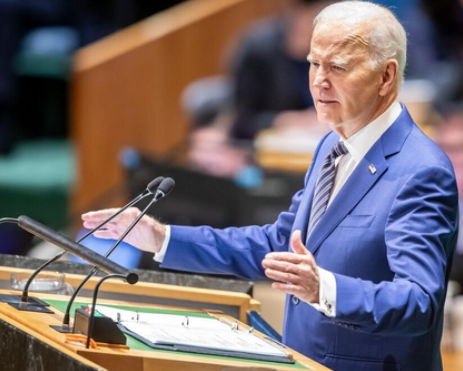America
US cracks down on China's access to advanced chips for AI fearing use in military applications

Washington, Oct 18
The US government has cracked down on China's access to advanced chips for use in Artificial Intelligence (AI) with its new additional limits over an October order to restrict the communist country's progress on supercomputing and AI which is the global frontline research in all countries. The US fears China may divert the chips of AI into military applications.
The Joe Biden administration on Tuesday announced additional limits on sales of advanced semiconductors by American firms, over restrictions issued last October to limit China's progress on supercomputing and artificial intelligence, The New York Times reported.
The new additionl rules will deter US companies from exporting or selling advanced semiconductors from the US to Chinese data centres, which reportedly use them to produce models capable of artificial intelligence. It's now mandatory for US companies to obtain either a special license or inform the government in advance while seeking to sell China advanced chips, or the machinery used to make them.
In order to check third country exports of such advanced semiconductors from the US companies. The US government under President Joe Biden has sought to eliminate the risk by making it mandatory for chip makers to obtain additional licenses to ship to dozens of other countries that are subject to US arms embargoes, the NYT said .
The Biden administration's restriction orders stems from fears that China's access to such advanced technology is dangerous because it could enable the country's military arsenal in building up guided hypersonic missiles, setting up advanced surveillance systems or cracking top-secret US codes.
Leading AI experts have warned that the technology, if not properly managed, could pose existential threats to humanity.
But AI also has valuable commercial applications, and the tougher restrictions may affect Chinese companies that have been trying to develop AI Chatbots like ByteDance, the parent company of TikTok, or the Internet giant Baidu, industry analysts said.
In the long run, the limits could also weaken China's economy, given that AI is transforming industries ranging from retail to health care, the Times said.
Nvidia, one of the leading chipmakers in the US, could see its sales affected drastically by the new US government order.
AMD and Intel are other leading chip makers who could see their sales drop in the export market and revenues dwindling affecting their stock value as China is a major export base for them.
Some chip makers earn as much as a third of their revenue from Chinese buyers and spent recent months lobbying against tighter restrictions.
The Global Race for Computer Chips: Pushing Back: Ahead of a renewed crackdown on the sale of semiconductor technology to China by the Biden administration, three of the world's largest chip makers campaigned vigorously to protect their businesses.
South Korea, a critical US ally with a semiconductor sector that depends on China, is wedged between Beijing and Washington in their trade war over technology.
SoftBank is hoping that Arm, the British chip designer it bought in 2016, will reap the fruits of the AI revolution. Arm's initial public offering is the largest this year.
India, seizing on the world's desire to reduce reliance on China, wants to build a semiconductor manufacturing industry from the ground up, an ambition as unlikely as it is bold, US semiconductor makers opined.
US officials however clarified that the new restrictions would exclude chips made purely for commercial applications, like smartphones, laptops, electric vehicles and gaming systems. Most of the rules will take effect in 30 days, though some will be effective sooner, reports said.
In a statement, the Semiconductor Industry Association, which represents major chip makers, said it was evaluating the impact of the updated rules.
"We recognize the need to protect national security and believe maintaining a healthy US semiconductor industry is an essential component to achieving that goal," the group said.
The Biden administration has been trying to counter China's growing mastery of any cutting-edge technologies by pumping money into new chip factories in the US.
It has simultaneously set new tough guidelines but narrow restrictions on exports of technology to China that could have military uses, while allowing other trade to flow freely.
US officials describe the strategy as protecting American technology with "a small yard and high fence".

5 hours ago
US sanctions two Indian nationals, pharmacy linked to fentanyl-laced pills

5 hours ago
Asianet: Unmatched Leadership in Viewership, Unrivalled Connection with Malayalis

8 hours ago
Trump swaps Biden portrait with autopen image in Presidential Walk of Fame

10 hours ago
Mexico slams US for immigration raids

11 hours ago
Somy Ali recalls Om Puri asking if he was too harsh while pulling her hair during intense scenes

12 hours ago
Pawan Kalyan's OG is Original Giant Blockbuster, says Nani

12 hours ago
Sanjay Dutt attends Bhasm aarti, offers prayers at Ujjain's Mahakaleshwar Temple

12 hours ago
Nitin Mukesh recalls first concert after father Mukesh’s demise, shares pics with Big B, Raj Kapoor

12 hours ago
Rihanna welcomes 3rd child with A$AP Rocky

12 hours ago
Kolkata limps back to normal after cloudburst horror; civic authorities, cops plan to prevent mishaps during Durga puja

12 hours ago
Kerala Devaswom Board chief apologises for clenched-fist slogan at Ayyappa Sangamam

12 hours ago
Teen attacks classmate with machete after school quarrel in TN's Tirunelveli

12 hours ago
Durga Puja: Bengal govt to open control room for monitoring weather, law and order situation






















